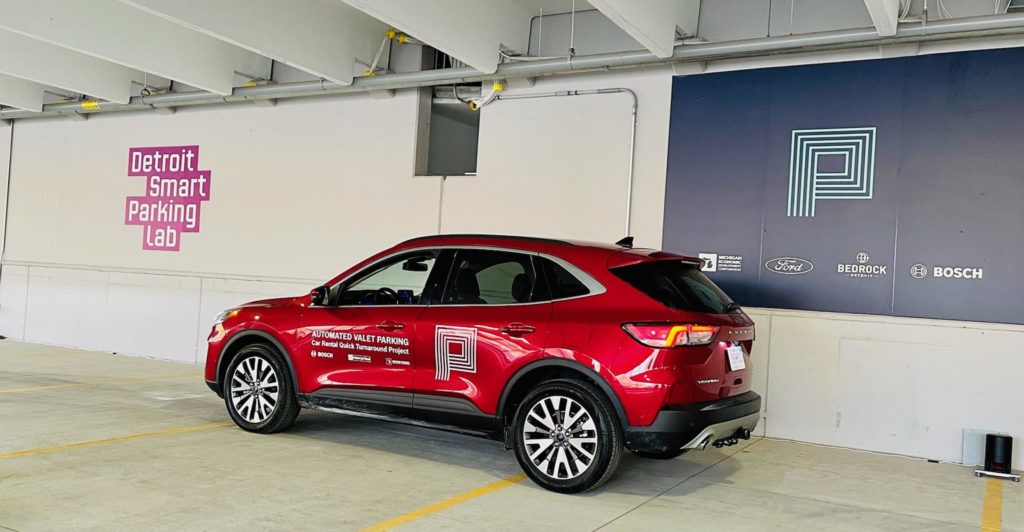Enterprise Tests Autonomous Parking at the Detroit Smart Parking Lab

Imagine you’re running late for a flight and know that the difference between making it on board or not is how long the line is at the rental car return. It’s a busy day for travel and countless people will be returning their cars today, but when you get to the parking garage there’s no sign of a line at all. You drop the car off near the entrance, grab your bags, and the car drives itself to its next stop for inspection and cleaning. No waiting for an attendant, no delays, and you make it to your flight on time.
That’s the experience Enterprise Rent-A-Car is after, and with technology developed by Ford and Bosch and tested at the Detroit Smart Parking Lab, that dream is close to reality. The Detroit Smart Parking Lab, hosted at the Bedrock Assembly Garage and operated by the American Center for Mobility is a partnership between the State of Michigan, Ford, Bedrock, and Bosch which offers a physical environment to simulate real-world scenarios for testing advanced technologies in parking, logistics and EV charging.
The system Enterprise is testing is called Automated Valet Parking (AVP) and was introduced last year by Bosch. AVP utilizes lidar units placed throughout the parking structure which monitor the car as it travels, directing it through the garage and allowing it to respond to any potential obstacles. The car communicates with these units and staff through simple 802.11 Wi-Fi technology and makes returning or summoning a car as simple as hitting a button on a tablet. AVP can also be adapted for use with 5G wireless communication and stereo cameras, as opposed to more expensive lidar units.
One of the benefits of AVP is how little needs to be added to the car itself. If a car has electric power steering, an automatic transmission with electric sifting, a remote starter, ABS and stability control, you simply need to add a little software along with a vehicle-to-infrastructure control module and the vehicle is ready to be parked autonomously.
“What’s interesting to us about this proof of concept is it’s kind of mimicking what’s happening in the real world but simplifying it to a pretty significant degree,” said Chris Haffenreffer, Mobility and Electrification Strategy and Innovation at Enterprise. “This gives us a sense of how it will help our business.”
At a press event on November 10th, the Detroit Smart Parking Lab gave attendees the opportunity to see how Enterprise may utilize Automated Valet Parking in the near future, ranging from drop off, to pick up scenarios, to how the cars will run themselves through the car wash and organize themselves in the parking structure. Currently every step of the car return process must be done by a person and especially at peak times, this can lead to human error. AVP can eliminate these kinds of errors and allow for efficiencies that would be impossible for human drivers.
You can get your own insight into the Detroit Smart Parking lab by attending the upcoming webinar, Michigan Mobility Connect: Smart Parking on December 14th from 11am to 1pm. The virtual event will kick-off with addresses from both the American Center for Mobility’s President & CEO, Reuben Sarkar and the Office of Future Mobility & Electrification’s Chief Mobility Officer, Trevor Pawl, followed by a Keynote Session from Craig Stephens, Director of Controls & Automated Systems at Ford Research & Advanced Engineering. Demonstrators, Enterprise, WiTricity, and Nvidia will conduct smart parking demonstrations, coupled with a deep-dive into the technology through a presentation, and a panel discussion moderated by Kevin Mull, Director of Business Development at Bosch Mobility Solutions.
